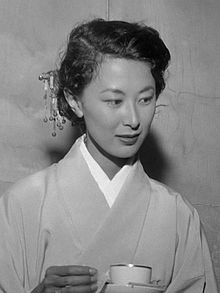Keiko Kishi
Keiko Kishi ( Japanese 岸 惠子 , Kishi Keiko ; born August 11, 1932 in Yokohama ) is a Japanese actress .
Life
Keiko Kishi grew up in her hometown of Yokohama. Already during her school days she took ballet lessons and was a member of a theater club. She began her acting career in 1951 at the age of nineteen in Noburo Nakamura's Waga-ya wa tanoshi and thus received a contract with the Shochiku studios. In her second film, Kedamono no yado , she played alongside the actor Kōji Tsuruta, who was then popular in Japan . In 1954 Keiko Kishi was involved in the Shochiku Studios' greatest commercial success, the melodrama Kimi no na wa by Hideo Ohba . She and Keiji Sada played the leading roles. These became so popular that many babies were named after the role names machiko and haruki and their way of wrapping the scarf around the head and neck was referred to as "machiko-maki" and was often imitated. The film saw two sequels. Kishi frequently embodied female characters from a more modern Japan, including a feudal convention struggling student in Keisuke Kinoshita's Onna no sono in 1954, the main character 's illegitimate mistress in Yasujirō Ozus in the early spring of 1956, and a mischievous secretary in Masaki Kobayashi's Karami- year 1962.
In 1957 she starred in the Japanese-French co-production Taifun about Nagasaki as a film partner of Jean Marais , directed by Yves Ciampi , with whom she was married from 1957 to 1975 and has a daughter. In 1958 she was slated for the role of Sabbi in David Leans ... because the wind can't read , but it went to Yoko Tani . Keiko Kishi starred in a play by Jean Cocteau in Paris in 1960 .
Together with Yoshiko Kuga and Ineko Arima , she founded the Bungei Production Ninjin Club in 1954 in order to achieve better acting quality in Japanese films . Her most famous production was Masaki Kobayashi's horror - episode film Kwaidan of 1964. Kishi plays the role in the second episode, the main role of a Schneefee next Tatsuya Nakadai . Her departure and financial losses led to the collapse of the company in 1966.
In Kōichi Saitō's The Rendezvous from 1972, which was also in the competition at the 1972 Berlinale , she played a prisoner accused of murdering her husband, who begins a fleeting love with a young man. In 1990 she was seen as a nun in Kei Kumai's Shikibu monogatari at the side of Eiji Okuda . Her other important films include Kon Ichikawa's Otōto from 1960 and Sydney Pollack's thriller Yakuza from 1974. Kishi played Eiko , the former partner of the main character Harry Kilmer (played by Robert Mitchum ). Her late work includes roles in Kah-chan from 2001, which was also directed by Ichikawa, and Samurai of the Twilight from 2002. Since the 2000s she has also appeared increasingly in television productions.
In 1996 Keiko Kishi became ambassador for the United Nations Population Fund . In 2004 she was awarded the Order of the Rising Sun, 4th grade, for her services . Two years earlier she also received the Japanese Academy Award for her acting performance in Kah-chan . Three of her films ( Kwaidan , Otōto and Yukiguni ) took part in the competition at the Cannes International Film Festival .
Awards
- 1955: Award of the Asia-Pacific Film Festival for best actress
- 1961: Blue Ribbon Award for best actress
- 1961: Mainichi Eiga Concours award for best actress
- 1991: Tanaka-Kinuyu-Award of the Mainichi Eiga Concours
- 2001: Nikkan Sports Film Award for Best Actress
- 2002: Japanese Academy Award for Best Actress
- 2004: Order of the Rising Sun 4th grade
Filmography (selection)
- 1951: Waga-ya wa tanoshi
- 1951: Kedamono no yado
- 1953: Kimi no na wa
- 1953: Kimi no na wa: Dai-ni-bu (2nd)
- 1954: Kimi no na wa: Dai-san-bu (3rd)
- 1954: Onna no sono
- 1955: Takekurabe
- 1956: Early Spring (Sōshun)
- 1957: Typhon over Nagasaki (Typhon sur Nagasaki)
- 1957: Arakure
- 1957: Yukiguni (first film adaptation of the novel of the same name by Kawabata Yasunari ; German book title: Schneeland )
- 1960: Ototo
- 1961: Who are you, Dr. Worry? (Qui êtes-vous, Monsieur Sorge?)
- 1962: Rififi in Tokyo (Rififi à Tokyo)
- 1962: Karami-ai
- 1964: Kwaidan (Kaidan)
- 1965: The temptation is called Jenny (Los pianos mecánicos)
- 1969: Mastermind
- 1972: The Rendezvous (Yakusoku)
- 1974: Yakuza (The Yakuza)
- 1975: Kaseki
- 1980: Koto
- 1983: The Daughters of the House of Makioka (Sasameyuki)
- 1990: Shikibu monogatari
- 2001: Kah-chan
- 2002: Samurai of the Dawn (Tasogare Seibei)
- 2005: Grave of the Fireflies
- 2009: Snow Prince: Kinjirareta Koi no Melody
literature
- Hans-Michael Bock: Lexicon film actors international . Henschel-Verlag, Berlin 1995, ISBN 3-89487-199-7 , page 453
Web links
- Keiko Kishi in the Internet Movie Database (English)
- Keiko Kishi's filmography in the Japanese Movie Database (Japanese)
Individual evidence
- ^ Hugh Cortazzi: Japan Experiences - Fifty Years, One Hundred Views: Post-War Japan Through British Eyes Routledge, London 2013, ISBN 978-1-134-27897-8 , page 180.
| personal data | |
|---|---|
| SURNAME | Kishi, Keiko |
| ALTERNATIVE NAMES | 岸 惠子 (Japanese) |
| BRIEF DESCRIPTION | Japanese actress |
| DATE OF BIRTH | August 11, 1932 |
| PLACE OF BIRTH | Yokohama , Japan |

